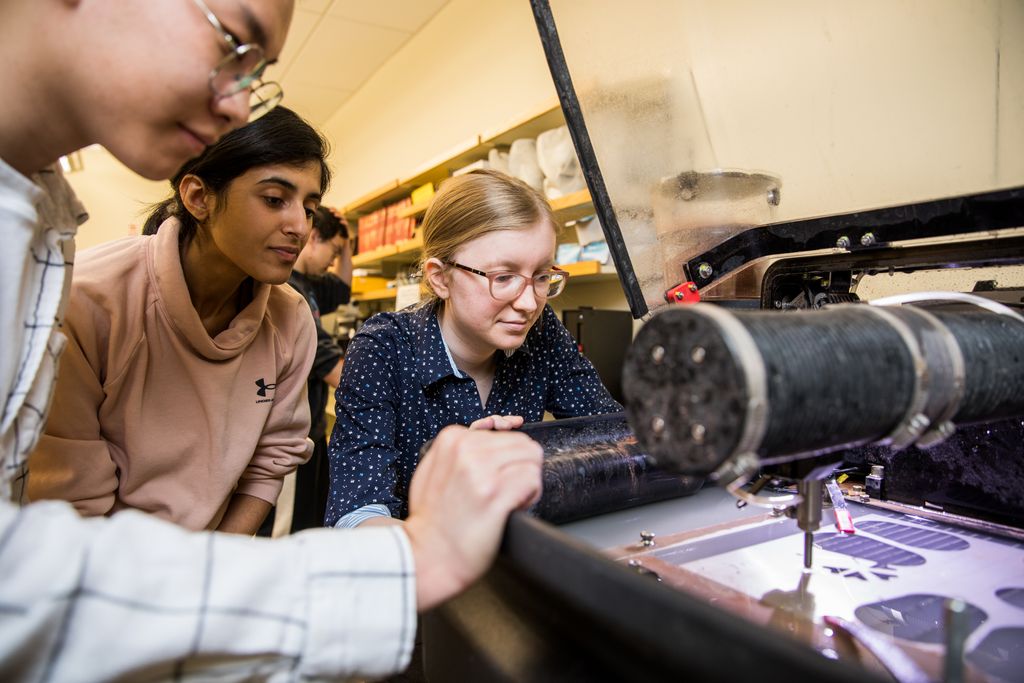M.S. Product Design & Manufacture
The Master of Science (MS) degree in Product Design and Manufacture is designed to train modern engineers to generate compelling new ideas—as well as the passion and leadership skills to translate those ideas into the practical design and mass production of innovative and cost-effective new products.
Degree Type
- Masters
Minimum Requirements
- 2 Semesters
- 32 Credits

The 21st century requires engineers capable of designing new products and quickly getting them to customers. The Master of Science (MS) degree in Product Design and Manufacture is designed to train modern engineers to generate compelling new ideas and translate them into practical design and mass production of innovative and cost-effective new products with passion.
Gain the skills necessary to develop your compelling ideas into innovative and cost-effective new products.
Accepting applications for Fall 2024: GRE is not needed from applicants to all master’s programs (except LEAP) who have earned or will earn, a 4-year degree from a U.S. institution. For these applicants, not submitting GRE scores will not have a negative impact on the evaluation of your application.

Program Options
Internships
Students can add an Engineering Practice designation – recognized by employers and research institutions – by developing and applying technical, project management, and leadership skills in a practical internship with a company or research institution.
Specializations
Students have the option of adding specializations in the rapidly emerging fields of data analytics, cybersecurity, or robotics to their degrees. Learn more.
Thesis or Practicum
Students take an elective course and complete a practicum, where they work with industrial partners on real-world projects; take project-intensive courses, or engage in independent study.
A Flexible Curriculum
- Core Courses (Choose 5 courses; 20 credits)
- Advanced Product Design (Fall) | Advanced Product Design (Spring) | Production Systems Analysis | Product Realization |Manufacturing and Supply Chain Strategy
- Engineering Elective (Choose one 500 or 700 level course, 4 credits)
- Design and Manufacturing Electives (Choose 2 courses, 8 credits)
- Practicum
- Satisfied by Product Realization
Our Spotlight Courses
Additive Manufacturing
As the range of materials used in 3D printing (additive manufacturing) expands from plastics to metals, the commercial possibilities are multiplying. Employers are eager to understand and master the associated design and manufacturing challenges. Developed by Professor of the Practice Anna Thornton, this new course exposes students to the theory behind additive manufacturing processes while providing ample opportunities for hands-on experience with machinery in EPIC (Engineering Product Innovation Center), taking real products from initial prototyping all the way to full production. EPIC houses our new GE metals 3D printer, one of only two dozen in engineering schools nationally, ensuring students in our new degree program will work with state-of-the-art tools in this rapidly evolving field.
“This course is incredibly demanding, but you’re also gonna have a lot of fun…You’re going to get a lot of hands-on work, but you’re gonna get the grounding in that fundamental theory.”
BU MechE Professor of the Practice Anna Thornton
Advanced Product Design
Developed by Professor of the Practice Greg Blonder, this survey course exposes students to all the elements of product design so they can figure out which area they would like to specialize in. This course covers product-market fit, basic engineering skills (CAD, artificial intelligence, materials, design…), how things are manufactured, and how to choose a design for a product which is easily manufactured at cost and NET quality. In the second semester, students build on the knowledge gained in the first semester in a hands-on, end-of-term team project.
“Our goal here is to train people to become designers that can actually get it into the market and make it a successful product.”
BU MechE Professor of the Practice Greg Blonder
